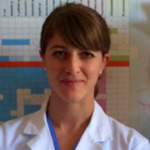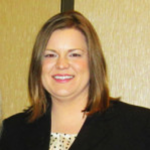WTS BRIGID SCANLAN
Traveling Mentorship Award
2015
Dr. Laura Seese
Congenital Heart Surgery, Ethics, and Life in Central America WTS Brigid Scanlan Traveling Mentorship Award 2015
Dr. Seese is in her first year of the I-6 training program at University of Pittsburgh Medical Center.
At almost every residency interview day, there is at least one interviewer who will ask the applicant to describe her dream job or perhaps where she sees herself in ten years. My dream job is to work as a congenital heart surgeon at an academic institution in the United States where I will be able to independently partner with international organizations to operate on children who need but lack access to heart surgery. The only issue with this lofty goal is that I had previously not actually seen international congenital heart surgery and thus had no evidence that the international aspect of my dream job was feasible.
In March of 2015, as a recipient of the WTS Brigid Scanlan Traveling Mentorship Award and under the mentorship of Dr. Kathleen Fenton, I had the pleasure of traveling to Tegucigalpa, Honduras and Managua, Nicaragua where I discovered the inherent struggles of operating in a foreign environment, the unwavering commitment required to treat each patient, and the ultimately the rewarding nature of international congenital heart surgery. My two week trip was sectioned into separate phases the first in Tegucigalpa, Honduras where I was able to work as part of a medical brigade and the second in Managua, Nicaragua where I was integrated into Dr. Fenton’s life as a full-time international congenital heart surgeon.
The first portion of the trip was spent in Tegucigalpa, Honduras at an old sanatorium that has since been converted into Instituto Nacional Cardiopulmonar “El Torax,” an active hospital for multiple disciplines including pediatric cardiac surgery. Since “El Torax” is missing several of the key members required for a successful pediatric cardiac surgery team, the hospital relies on medical brigades to volunteer their services to help the children in Honduras as well as to help train the local medical personnel to provide care for patients with congenital heart defects. The first day of this two-week long brigade is the pre-operative clinic day where the brigade’s cardiologists, surgeons, and anesthesiologist see the hundreds of patients who line up outside the hospital hoping to be chosen for one of the forty operative spots. After the patients had been selected, I spent time learning about each aspect of international congenital heart surgery, from the preoperative assessment, to the operative procedures, to the anesthetic considerations and monitoring, to the intraoperative and post-operative ECHO reads, and finally the post-operative intensive care period. The entire course of a patient’s care is much different on an international stage. In place of the seemingly endless resources we utilize in United States, brigade-based international surgery is isolated to a very narrow window for recovery time and operates with limited resources, which makes this surgery environment even higher stakes emphasizing the importance of patient selection, surgeon skill, and a top-notch critical care team. The next portion of the trip was based in Managua, Nicaragua where I was able to stay with Dr. Fenton and be fully integrated into her life as an international congenital heart surgeon. During my time in Managua, I scrubbed on an atrioventricular canal repair and took night call with Dr. Hernandez, a pediatric intensivist, post-operatively to see the full spectrum of our patient’s care at Salud Integral, a private hospital in Managua. I was also able to explore the differences in the types of health care delivery systems (i.e. private hospitals versus public hospital systems) by operating with Dr. Fenton’s colleagues at a nearby public hospital in Leon, Nicaragua. A very striking reality for me was that there are clear disparities in levels of care patients receive at the private and public systems in Nicaragua. The private or fee for service system is almost identical to the health care received in the United States with individual rooms, technologically advanced operating rooms, electronic medical records, and one-to-one nursing care in the intensive care unit. The public system, on the other hand, has post-operative patients sharing beds with each other in roach infested wards, outdated operating rooms with non-functional anesthesia machines, and a single nurse for multiple wards of post-operative patients. Over time, I found myself disheartened by the inequality in levels of care between the private and public system but fortunately there are physicians, like Dr. Fenton and her colleagues in Asociacion Programa Corazon Abierto, whose professional desire is to provide private level care for children with congenital heart defects who would otherwise not have a way to financially access to heart surgery. In a country with a challenging political climate, running a non-profit organization, like Asociacion Programa Corazon Abierto, that provides free heart surgery is not an easy task for any of the team members involved and clearly requires a sacrificial attitude and an unwavering commitment to the children of Nicaragua.
In addition to her work as a surgeon, Dr. Fenton is also an ethicist. Many of our casual conversations outside the operating room focused on ethical dilemmas in congenital heart surgery and the world of medicine at large. We discussed how to appropriately merge ethical implications with the clinical indications for patient selection in brigade-based surgery. We also explored how surgeons handle the pressure of knowing that one technical mistake could cost a child’s life as well as how to eventually feel absolved following a bad outcome when associated with surgeon error. Considering how affected I was by the disparity between the two health systems in Nicaragua, we further explored the ethical implications for those who profit from the private healthcare system but choose not to invest in improving the public health sector. We also discussed the ethical and patient safety issues that arise from working in country with a challenging political atmosphere where occasionally surgeons may be hired based on their political affiliations instead of their qualifications.
Lastly, since the Scanlan/WTS Traveling mentorship scholarship is sponsored in part by the Women in Thoracic Surgery organization, I made it a point to observe the way patients, colleagues, and communities treated female surgeons. Interestingly, I came to these Latin American countries with the impression that “machismo” ideals would infiltrate and dominate the workplace. I could not have been more wrong. With the feminization of many words in Spanish, the idea of a “doctora” or a female physician is deeply engrained in the culture and the vocabulary as a separate but equally valuable member of the medical team. The female physicians, surgeons, and resident trainees who I worked with were treated with the utmost respect and without confusion as to their role on the health care team.
Overall, I am abundantly grateful to Women in Thoracic Surgery, Scanlan International, and Dr. Kathleen Fenton for the opportunity to travel to Nicaragua and Honduras to explore the international aspect of my future career in congenital heart surgery that I am now even more invested in making a reality. When starting my residency in integrated cardiothoracic surgery this summer, I know I will carry the lessons learned from Dr. Fenton, her colleagues, Central America, and of course every patient. I am so thankful for this opportunity to have traveled to Central America to unearth discoveries about myself, my desired career, and the world of congenital heart surgery beyond the shores of the United States.






